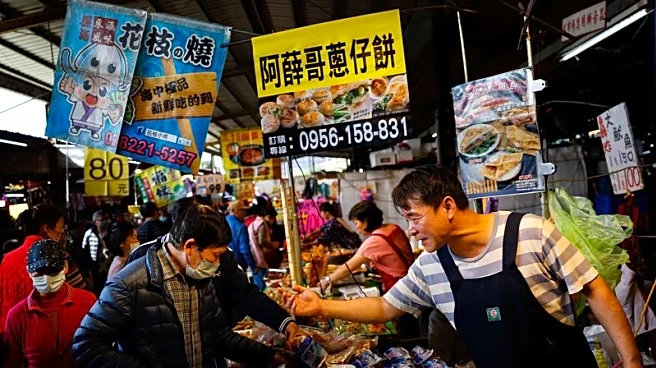What's Happening?
Rodrigo Paz, a centrist and former Bolivian opposition senator, has won the presidential election, marking the first conservative victory in Bolivia in 20 years. Paz defeated former President Jorge 'Tuto' Quiroga in the runoff election, surprising many
with his ascent from relative obscurity. He inherits a struggling economy, plagued by a shortage of U.S. dollars and fuel shortages, following two decades of rule by the Movement Toward Socialism party. Paz's campaign focused on gradual economic reforms, contrasting with Quiroga's more aggressive approach involving an IMF bailout. His victory is seen as a shift towards pragmatic, business-friendly policies, aiming to lift Bolivia out of its worst economic crisis in four decades.
Why It's Important?
Paz's victory signals a potential shift in Bolivia's economic and political landscape. His approach to reform, which includes eliminating fuel subsidies and devaluing the currency, aims to stabilize the economy while providing cash handouts to cushion the impact on the poor. This could lead to improved relations with the United States, as indicated by U.S. Secretary of State Marco Rubio's statement expressing readiness to partner on shared priorities. The change in leadership may also affect Bolivia's alliances, moving away from previous ties with Venezuela, China, and Russia, and towards stronger bilateral relations with the U.S., potentially impacting regional security and economic dynamics.
What's Next?
Rodrigo Paz is set to take office on November 8, and his administration will likely focus on implementing the promised economic reforms. The international community, particularly the United States, may play a significant role in supporting Bolivia's transition, as Paz has expressed interest in improving bilateral relations. The new government will need to address the immediate economic challenges while balancing public expectations for gradual change. Observers will be watching how Paz navigates the political landscape, especially in terms of maintaining support from diverse voter groups and managing potential opposition from entrenched interests.
Beyond the Headlines
Paz's presidency could redefine Bolivia's political identity, moving away from the socialist policies of the past two decades. His focus on anti-corruption and pragmatic reforms may resonate with a broader segment of the population, including those disillusioned by previous administrations. The shift in foreign policy, particularly towards the United States, could have long-term implications for Bolivia's role in regional politics and its economic partnerships. Additionally, Paz's ability to balance conservative economic policies with social welfare measures will be crucial in maintaining public support and ensuring stability.
















